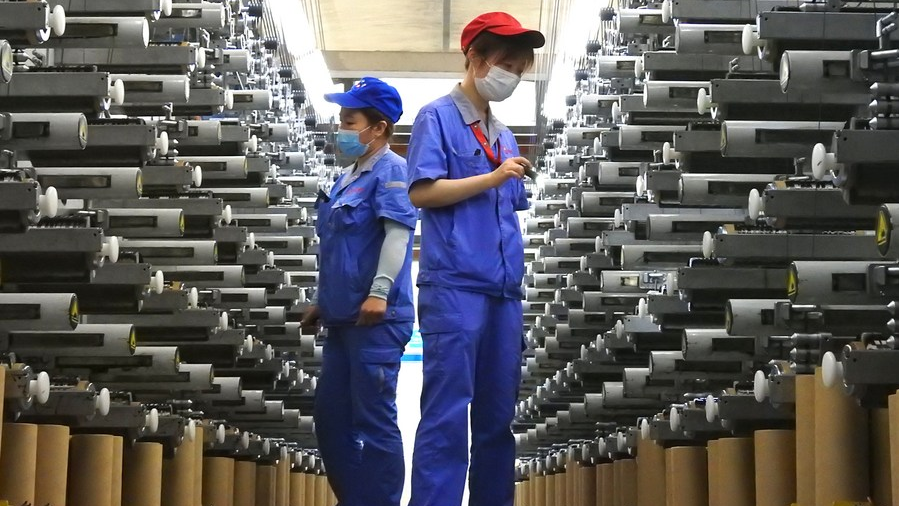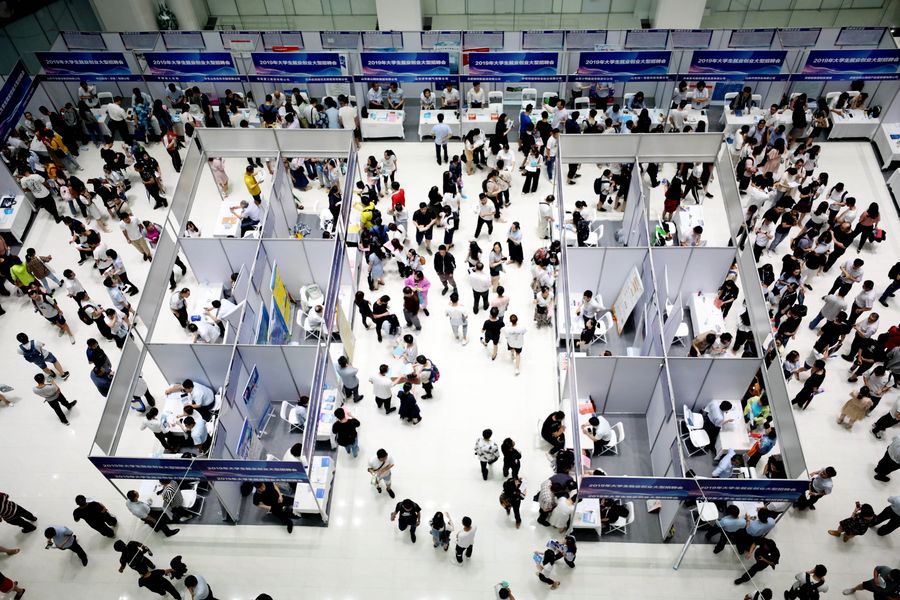
Workers check a production line at Lianyungang Economic and Technological Development Area in Lianyungang, east China's Jiangsu Province, July 16, 2020. /Xinhua
Workers check a production line at Lianyungang Economic and Technological Development Area in Lianyungang, east China's Jiangsu Province, July 16, 2020. /Xinhua
Editor's note: Keith Lamb is a University of Oxford graduate with an MSc degree in Contemporary Chinese Studies. His primary research interests are international relations of China and China's "Socialism with Chinese Characteristics." The article reflects the author's opinions, and not necessarily the views of CGTN.
On November 24, President Xi Jinping at a gathering at the Great Hall of the People in Beijing to honor model workers and exemplary individuals underlined China's working class's key role in eliminating poverty and building a moderately prosperous society.
Recognizing and decorating the working class is laudable. It provides reaffirmation that the Communist Party of China stands for the workers who make up the majority of the population, and it focuses workers' attention on their own achievements, which are the basis of China's development.
At the gathering, Xi thanked working people for their outstanding contributions to the reform and opening-up as well as socialist modernization.
Who belongs to China's working class? For many, the term "working class" conjures up the image of the proletarian manual laborer, which excludes white-collar "thinking-labor." This division has a long tradition going back to Max Weber, who, along with Karl Marx and Emile Durkheim, is one of the founders of Sociology.
However, ultimately, blue- and white-collar workers are both engaged in wage labor and, as such, their interests in achieving socialism should be the same. Thus, they should rightly be considered a single working class, albeit in different positions within this class.
In fact, white-collar workers as part of the working class are merely more prosperous workers who have greater access to higher education and more opportunities to consume than the blue-collar workers.
The division within the working class could hinder China's development goals. As China's market economy grows, the traditional proletariat may feel at odds with a burgeoning white-collar working class. Furthermore, the very social values important for self-improvement and social progress may become absent from the proletariat should they ever feel their lower position in the market value chain becomes either immutable or not more valued.
China is currently faced with the "divided working class trap," as what I would call it, which is prevalent in many Western societies – due to market allocation of housing, blue-collar workers tend to settle for lower-quality schools and infrastructure than white-collar workers. Self-improvement under this condition becomes an arduous task, never mind the overall social development within the community.
Consequently, the Western working class, at least in the Anglosphere, is a divided one. Thus, the middle-class label in opposition to the working class is reified as blue- versus white-collar workers, values, and cultural fissure.

People attend a job fair for university and college graduates in Jinan, east China's Shandong Province, July 6, 2019. /Xinhua
People attend a job fair for university and college graduates in Jinan, east China's Shandong Province, July 6, 2019. /Xinhua
White-collar workers, whose taxes pay for welfare, are more likely to call for policies to dismantle the welfare system; the traditional proletariat and the "welfare-class", in turn, swing to the right who give them quick, short-term solutions to their plight.
What I have described above is still fairly absent in China as a result of overwhelming social advancement for all, which has ameliorated conflict and maintained unity. However, China's upgrading of its economy means it needs to be vigilant for signs of class disunity.
China's drive to upgrade its technological capacities will lead to an increase in white-collar workers. A McKinsey analysis indicates that the Chinese middle class could reach 550 million in three years. This is more than one and a half times the entire U.S. population.
On the one hand, this could lead to a division between the haves and have-nots; on the other hand, more of the traditional proletariat will rise into higher-paid white-collar jobs, leading to increased confidence in China's governance. A third possibility is that with the upgrading of China's economy, blue-collar workers will become more skilled and more valued by the market and so more highly respected.
China, I believe, does, in fact, have all the prerequisites for overcoming the "divided working class trap."
Firstly, China's Confucian values imbue China with social respect that makes even poverty-stricken areas feel safe compared to moderately poor areas of the UK and the U.S. In addition, self-improvement through education is universally highly valued even for those at the bottom rungs in China's society. Sadly, these two factors are largely absent in many developed Western states, which becomes an obstacle for individual and social development.
Secondly, China's governing system, combined with its ideology and poverty alleviation experiences, bodes well for overcoming the "divided working class trap." Targeted poverty alleviation approaches, and not just placating welfare, can also be used for bridging future class cleavages.
Finally, China's governing system is often able to act more swiftly and innovatively in contrast to a lot of Western countries.
More concretely, the upcoming Five-Year Plan, with emphasis on dual circulation, will increase freedom to consume, which has thus far been lacking for much of the Chinese proletariat; the ongoing focus on building an ecological civilization will improve China's environment, which is especially pertinent for China's blue-collar workers who man the factories and the coal mines; the Healthy China 2030 blueprint, which aims to bring universal health care to an unprecedented number of the global citizenry, will be a huge leveler to all members of China's working class.
(If you want to contribute and have specific expertise, please contact us at opinions@cgtn.com.)

